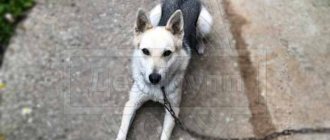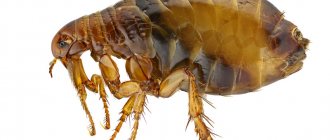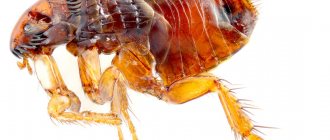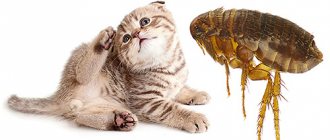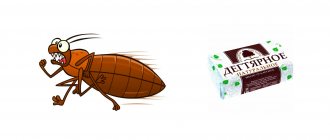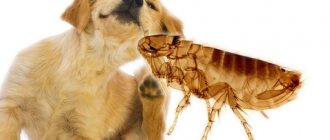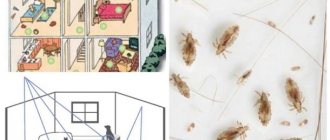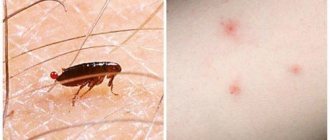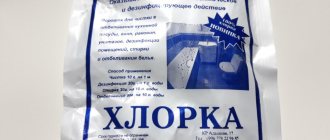The term "basement fleas" is used to refer to all types of these unpleasant insects that can parasitize people and animals.
The given name is collective and characterizes the behavioral characteristics of arthropods, in particular the localization of flea colonies in basements, ground floors and other rooms where all favorable conditions are available - heat, dampness, moisture, food sources.
It is for this reason that these parasites are especially often found in apartments located on the first floors, which causes a lot of inconvenience to the owners.
Basement fleas also pose a certain danger, as they are carriers of dangerous diseases. How to get rid of an unpleasant neighborhood? How to poison fleas in the basement of a house and how to prevent the reappearance of parasites? Let's talk about this further.
Why do fleas appear in the basement?
Fleas in the basement of an apartment building spread within the habitat. Various rodents, homeless or pets, people can transfer them to another place . These can be larvae, eggs or adults. If there is an infected object near the cellar or basement, then after some time the parasites will move to a new place to reproduce. The female lays about 500 eggs at once in hard-to-reach crevices and cracks. They can be transported in folds of clothing, wool, or garbage.
Basement fleas appear in the house for the same reasons. Risk areas include garbage chutes, attics, dark and non-residential premises. To remove them, only regular flea treatment in the basement and other objects will help. Otherwise, these parasites will fill an impressive territory, spread diseases and viruses, and annoy people and their pets.
Reasons for appearance
If basement fleas appear in a clean and well-kept city apartment, this may well cause some confusion for the owners, because it is generally accepted that the penetration of parasites is possible only if sanitary and hygienic standards are not observed. However, everything is not so simple.
The appearance of fleas in the basements of urban high-rise buildings occurs, as a rule, when only a few adult individuals enter the room.
The main route of spread of parasites is the following - penetration into the basement of an infected animal, person, old rags, furniture.
Since basements often contain habitat conditions suitable for fleas, colonies of parasites begin to rapidly increase. In search of food, arthropods enter apartments through small cracks and sewer pipes.
What are the dangers for humans and pets?
A residential private or apartment building is susceptible to attacks by parasites. They carry dangerous diseases, viruses transmitted through bites. In this case, pathogenic bacteria enter the body by injection. It is best to avoid such places, and if appropriate means are available, fight until all individuals and eggs are completely removed.
What diseases do they carry?
You can get rid of fleas in the basement. You should also resort to preventive procedures. Parasites can carry the following diseases:
- Encephalitis;
- Worms of different types;
- Fungal infections;
- Listeriosis;
- Plague;
- Pediculosis;
- Salmonellosis;
- Typhus;
- Anthrax;
- Tularemia.
These are just some of the diseases transmitted by flea bites. Many of them are treated for a long time, using physiotherapy and expensive medications.
Allergic reaction
A private house or high-rise building can be infested with parasites. In addition to serious diseases, they cause allergies. People susceptible to these reactions experience severe discomfort. Rashes may appear on the body, and with increased intensity of development, even blisters. If there are many individuals, then the entire body may be covered with small red wounds. Treatment is medication. In such situations, the patient should be isolated to avoid repeated contact with pathogens. Clothes should be treated with flea chemicals or thrown away.
Contact the professionals
Coping with the problem of basement fleas on your own can be extremely difficult, so in modern realities people are increasingly turning to the help of professionals. This is the easiest, most effective and safest way for the consumer to get rid of fleas, which gives a guaranteed long-term result of comprehensive disinfestation of premises. During disinfestation, professional products are used that have a long-lasting effect, which guarantees protection against parasites for a long time. The treatment is carried out by professionals who use the latest disinfestation technologies using professional equipment, which allows them to thoroughly and effectively treat contaminated areas. Upon completion, a guarantee is provided for free re-treatment if the expected result is not achieved after the first procedure. However, when choosing a disinfection company, you should pay attention to a number of important points so as not to be deceived and get the expected result. When choosing a company, you need to pay attention to:
- The company must have the appropriate documents allowing it to carry out disinfection work in residential premises (within the framework of the current legislation of the Russian Federation, work on disinfection is subject to licensing by order of the Ministry of Health of the Russian Federation dated March 11, 2013 No. 121n, the enterprise must have a license for medical activities, requirements for the organization and implementation of disinfection activities are established in the Sanitary and Epidemiological Rules SP 3.5.1378-03 “Sanitary and Epidemiological Requirements for the Organization and Implementation of Disinfection Activities”, approved by Resolution of the Chief State Sanitary Doctor of the Russian Federation dated 06/09/2013 N 131);
- Preparations that will be used for disinfection must be certified and safe for people and animals. Since disinfection is a complete treatment of the territory, including walls, furniture, baseboards, etc.;
- Events are planned at a time convenient for you, the company makes a compromise with the client;
- The workers spoke clearly and in detail about the upcoming event, the drugs that would be used, as well as whether it was possible to remain in the room after disinfection or whether it was necessary to leave it and for how long;
- A conscientious, self-respecting company does not require advance payment; all payments are made after the disinfection procedure;
- If you are not satisfied with the result, you are guaranteed either a refund or a free repeat procedure.
It is recommended to repeat this procedure once a year.
The most effective methods of combating the parasite
Methods to combat the parasite include various folk and chemical remedies. They must be handled with extreme caution and care. Keep away from children and pets.
Chemical insecticides
Basement fleas and fighting them are sometimes a headache for home residents. Among the simple substances that are harmless to humans are ordinary crayons with active additives and powders. Dangerous substances include chemical ampoule, bomb (smoke screen), aerosols, and liquids. These include Sinuzan, Chlorpirimak, Biorin, Kombat, Varan.
Folk remedies
Folk remedies for fighting parasites can be found in any pharmacy. These are Persian chamomile (pyrethrum), tar soap (tar), boric acid (also used against cockroaches), table salt, baby soap, soda, essential oils.
Eliminating larvae
The larvae that fleas lay in large numbers can become a serious problem. Often, a few days after treating an apartment, residents are surprised to discover new insects. To prevent this from happening, it is necessary to promptly destroy all larvae deposited by fleas.
Thoroughly spray and coat with chalk all the cracks and corners of the house. In the basement, dust it off, get rid of rat nests and holes, and then treat everything with powerful products. In addition to them, use dusts (for example, Fenaxin and Clean House), as well as boric acid, Pyrethrum powder and industrial insecticides in hard-to-reach places. Experts consider the use of dusts to be the most effective. The fact is that flea larvae feed on substances of organic origin, which include this type of insecticide. Having eaten the dust, the larvae begin to rapidly die.
Of course, such careful processing will take a lot of time. But the measures taken guarantee the complete destruction of the new generation of parasites.
Preparing premises to combat basement fleas
If an apartment or private building has a cellar or basement that requires treatment, then it needs to be prepared:
- Remove trash.
- Drive out stray animals and people.
- Clean off old paint, dirt, dust, cobwebs (they will retain the solution).
- Wash the floor and walls with a disinfectant solution.
This is a mandatory list of work before flea sanitization.
Preventive measures
Adult fleas most often do not crawl across the thresholds of apartments or basement entrances, entering there on an animal or person. The use of crayons in this case is ineffective.
It is best to use powdered products (DDT, Deltamethrin, Pyrethrum, etc.). They penetrate well into cracks and hard-to-reach places, remain there for a long time and serve as poison both for adult insects seeking shelter and for their larvae, which swallow the drug when feeding.
Ventilating the premises in cold weather (spring, autumn) helps reduce the number of possible parasites in a basement where vegetables are not stored. Some of the larvae will die.
In apartment buildings, it is advisable to require the management company to carry out preventive treatments once every 3 months. Household trash (old furniture, textiles, organic waste, etc.) should not be stored in the basement. All entrances must be closed to prevent dogs and cats from entering.
Prevention of fleas entering an apartment should be the use of repellents when walking pets. The pets themselves are protected with collars, drops, and sprays against parasites.
How is the basement and apartment disinfected?
It is possible to treat the basement against fleas not only on your own, but also by contacting a specialized company. The product used must be effective, high quality, and safe. Typically water-based aerosols are used. Purchased options are more expensive. Specialized stores sell powders that dissolve in liquid.
Flea spray for indoors: for a review of effective products, read more in the article here.
For spraying, you only need a spray bottle (for large areas, a hose and compressor installation is used to regulate the pressure). The liquid should get into all areas, including hard-to-reach areas (burrows, crevices, cracks). The compositions act immediately (you will need protective equipment - a mask, goggles, a suit). After 2-3 weeks, re-treatment should be carried out.
Processing a basement or cellar
Now it's time to move on to pest control of the basement or cellar. To do this, choose a more powerful product than what you used at home. Pay attention to the drugs, Sinuzan, Tetrix and Diazinon. Manufacturers do not recommend using them for residential premises, but they are ideal for exterminating insects in the basement.
First you need to clear the basement of all unnecessary things. Fleas love to live in piles of old clothes and trash. Without removing them, you will not be able to carry out full processing.
Spray all surfaces, corners and crevices of the basement. When leaving there, do not forget to limit the access of air as much as possible - close the door and windows tightly.
Removing insects from animals
When getting rid of fleas, you need to poison all adults and eggs. For these purposes, Butox is used - a liquid against parasites, used on premises and living creatures. The concentrate is mixed with water in appropriate proportions and then sprayed with a spray bottle. There are other ways, such as:
- Collars, headbands against parasites (for cats, dogs, large rodents, parrots).
- A mixture of borax and baking soda (it is used to cover carpets, bedding, and houses for small and large pets).
- A mixture of garlic (can be dried) and brewer's yeast. It can be used as a supplement to everyday food. The smell repels parasites and creates a barrier to attack.
- A flea comb is one of the most effective methods. Unlike any other comb, the teeth of the comb are located at a short distance from each other, which allows them to physically trap and remove adults, eggs, and dirt from the pet. After the fur is completely dry, you need to comb it several times.
- Mosquito plant is a natural and very powerful repellent. It is applied to the skin to kill germs, ward off insects and treat skin conditions.
- Citrus is considered one of the most effective natural ways to get rid of fleas. Many natural sprays contain the citrus extract D-limonene, which is responsible for getting rid of parasites. You can make it yourself from lemon, orange zest and water.
- Use a light source (lamp, luminaire), soapy water near the pet’s sleeping place.
This is a basic list of common methods. As you can see, there are many options that get rid of parasites quickly and safely.
Animal treatment
To remove basement fleas from your pets' fur, use the following products.
- First, wash the animal with a special shampoo. This is one of the most reliable means. Repeat the procedure 2-3 times with a break of several days until the insects completely disappear. Then use it 1-2 more times as a preventative measure.
- A very effective drug for eliminating fleas are drops, which you can purchase at a veterinary pharmacy or clinic. For several weeks, drip them onto your pet's withers. They will not only destroy all the parasites present on the animal, but will also scare away new ones.
- If the animal suffers from numerous parasites and you want to get quick results, use the drug. Nitenpyram is designed for internal use and works within 1 hour (but be sure to talk to your veterinarian first).
- Purchase and replace flea collars regularly. Read the instructions carefully: a regular collar can protect your pet from 2 weeks to 1 month.
If you have a small or sick animal, choose medications for its treatment very carefully. You need to find the least toxic option.
If your pet has parasites, choose the most gentle and safe remedy.
Rodent baiting
Rodent baiting can be done independently using modern methods. They are divided into folk, chemical, mechanical, biological. The simplest and most cost-effective remedy is biological. It involves using animals (cats, hedgehogs). They actively begin to hunt in the territory with a limited diet. Mechanical devices include traps, mousetraps, and traps. Additionally, you will need bait (a piece of edible material), glue for fastening, and also as an amplifier for the trap.
Attention! Care should be taken when handling chemicals. Many of them contain active ingredients that can harm the human body or pet. It is possible to remove rats and mice using aerosols, suspensions, or feeding containing a special powder. The most common are Ratindan, Ratomor, Krysid, Zookoumarin. The composition is usually placed in the habitats of the animal - holes, cracks, holes in walls, floors.
Traditional methods also help. These include substances such as ash, flour, gypsum, mint, garlic, and pine shoots. Rodents have a sensitive sense of smell, which prevents them from not paying attention to strong, specific odors.
Experts advise combining techniques and being smart. For example, you can catch large individuals using a bucket, a short board, straw, sunflower oil, and wheat seeds. Climbing to the top of the structure in search of food, the individual will slide down the board into a bucket of water. The problem will be solved.
Reviews
Try it yourself first.
Buy Neostomazan at a veterinary store or veterinary pharmacy - it costs a penny. Dilute with 5–10 liters of water and rinse the floors. Treat the door mat and wash at least the landing. Neostomazan has the smell of some kind of kerosene, and if this is unacceptable, then use flea shampoo. This is in an apartment, but in the entrance to the summer landing it’s better to use an uncoated one and a stronger solution. And the sanitation station can treat entrances and basements. And their products are also smelly and toxic. And you have a baby. But call and check with them. Now, I remembered that in addition to all the methods described above, I also plugged the thing into the insect repellent socket. I don’t know what helped, but the fleas disappeared. I have two dogs and there were no fleas on them (they were treated with drops and wearing flea collars), but they were jumping in the apartment, apparently from the basement. We have the second floor. stepasha
https://forum.ditenok.com/showpost.php?p=1269198&postcount=21
buy dichlorvos, spray the whole apartment with it, close all windows and doors for 2 hours, leave.
Then after 2 hours you return, check the room for about 40 minutes and wash all surfaces with a cleaning agent, there will be no more fleas, this saved us Alexandra89
https://forum.ditenok.com/showpost.php?p=978750&postcount=11
In our basement there are fleas living on stray cats, and when we go for cans, they inevitably end up in the house.
We got rid of it with the help of wormwood, we bought it at the pharmacy. We did it as the solution was written on the package, only to be sure, I doubled the dose, just to be sure, and sprayed the walls, carpets, and beds liberally. Then I washed the floors. I didn’t believe that it would help, but they left. kruchek_nv
https://forum.ditenok.com/showpost.php?p=834375&postcount=10
Ouch.
We had this happen a couple of weeks ago. Here's how we got rid of it: we bought dichlorvos (odorless), sprayed it on the floor and carpets. We closed the windows and went for a walk for half a day. Then they vacuumed it well and ventilated it. They repeated it a couple of days later. and then they sprayed it again, but this time with a decoction of tansy. So far nothing is bothering me and the cat is not itching. Asashay
https://www.woman.ru/rest/freetime/thread/3981213/
Answer from a pest control specialist.
Most often, the first floors of an apartment suffer from fleas, because... fleas emigrate from the basement. Probably few people know that once a quarter, depending on the area of the locality, the ERC orders disinfestation of basements. But it doesn’t always fulfill its duties, it’s just laundering the money :ne_ne_ne:. You can get rid of fleas in an apartment using such professional means as: “Sipaz Super”, “Sinuzan”, “Extermin-ts”, “Avalon”, but you need to remember that these drugs are specialized and you need to be able to work with them. It would be cheaper and more practical to call a specialist, an exterminator. Anton
https://uborka-doma.net/index.php/topic/35-kak-izbavitsia-ot-blokh-doma-v-kvartire/#entry9720
I place regular wormwood in the corners.
Well, I clean the carpets with a washing vacuum cleaner using a carpet cleaner. I wouldn’t risk using dichlorvos, the smell and it’s still a chemical, and if there are animals in the house, they can get poisoned. Malinka
https://uborka-doma.net/index.php/topic/35-kak-izbavitsia-ot-blokh-doma-v-kvartire/#entry219
Services of professional firms
On the Russian market there are specialized companies engaged in breeding rodents, unwanted (stray) animals, and insects. They use effective means - aerosols, traps, and other methods. This procedure helps to quickly and efficiently achieve what you want. The cost of services depends on the location of the constituent entity of the Russian Federation. Citizens do not always have enough knowledge to combat fleas, and inaccurate information can aggravate the situation several times. The professional services of companies are often used by kindergartens, educational schools, technical schools, colleges, and industrial institutions.
Ways to get rid of fleas and eliminate larvae
The only way to get rid of biting synanthropic parasites is total persecution of adults and their larvae. You can remove insects from your home using both folk and chemical means. But bloodsuckers will be able to penetrate into a clean apartment again, regardless of the type of human habitation. For example, in St. Petersburg, basement fleas appear from somewhere not only on the first floor, but also on the 15th floor of new apartment buildings.
Comprehensive insect control should begin with the treatment of pets. Vet pharmacies have affordable medications for cats and dogs of all ages (Bars, Frontline, Hearts, etc.).
They need to be applied according to the instructions: drops on the withers, sprays and shampoos to treat the pet’s entire body, etc. An effective remedy is collars (for example, Beafar).
In a private home, in addition to treating animals, it is necessary to independently destroy the rodents that live in utility rooms. Poison for rats and mice can be purchased at the SES or pet store, or hardware stores. After deratization, you need to begin treating the basement premises from the parasites and their larvae living there.
Effective flea treatments for pets.
Flea chemicals
If there are fleas in the basement and in the living area, you can poison them with any household sprays designed to kill insects at home.
When choosing a product, it is advisable to pay attention not only to the name of the drug, but also to its purpose: products for crawling species (bugs, cockroaches, etc.) will be most effective against fleas.
The most effective drugs are those containing permethrin, cypermethrin, etc.:
- Raptor (spray for treating premises against cockroaches, fleas, bedbugs, etc.);
- Raid (aerosol packaging);
- Battalion commander
In addition to them, the use of other poisons is also allowed: Karbofos, Dichlorvos, Chlorophos and the like.
The drugs are also available in concentrated form for self-preparation of solutions (Tetrix, Cucaracha, Tsifox, etc.). In this case, treatment is carried out using a sprayer.
Effective insecticides for treating apartments.
Powdered dusts (DDT) are also effective against fleas. They need to be sprayed with special devices.
Powders are used only for treating rooms where people or pets are not constantly present (for example, you can dust the floor in the basement, and use aerosols in the house).
Chemicals quickly destroy any insects that fall on their covers. Remaining on the surfaces of the floor, cracks, etc., aerosol products continue to act for several more days.
Powdered preparations have a longer duration of action and are capable of destroying flea larvae leaving eggs, cockroaches and bedbugs, as well as harmless but unwanted human neighbors (woodlice, two-wort, beetles, spiders, etc.).
Folk methods of struggle
Unlike chemicals, traditional methods are not as effective. They are aimed rather at preventing the appearance of insects: aromatic herbs, which are used to get rid of fleas, expel parasites without destroying them. Such remedies include decoctions of lavender, wormwood, tansy, etc.
Garlic tincture is a folk remedy for killing basement fleas.
Garlic infusion is also used to expel bloodsuckers:
- Pour crushed garlic (2-3 medium heads) with cold water (10 l);
- leave for 3-4 days, then strain and spray the walls and floors in the basement and other utility rooms;
- repeat treatment once a week.
In non-residential premises (in the basement), a sulfur bomb will help destroy insects. It can only be used in cases where the exit from the basement floor is on the street. Before lighting the sulfur, you need to seal the windows and seal the front door so that the smoke remains in the room for 1-2 days, destroying not only fleas, but also rodents, fungi and putrefactive bacteria.
Apartment pest control
Before poisoning fleas in an apartment, it is necessary to thoroughly clean the room: eggs and larvae can end up anywhere. The following activities need to be completed:
- carry out a complete wet cleaning (wipe off dust, wash floors and horizontal surfaces), you can add vinegar to the water (1 glass per 10 liters);
- wash or dry-clean clothes, bed linen, soft toys, slippers and textiles from sofas, armchairs, etc.;
- pay special attention to cleaning pet equipment: beds, toys, cages;
- Take upholstered furniture and large items that cannot be washed (blankets, pillows, etc.) outside and thoroughly knock the dust out of them or treat them with a steam generator (for example, carpeting on the floor).
Products containing permethrin are dangerous to fish and aquatic fauna. The aquarium must be closed before treatment. The remaining pets and children are removed from the apartment for 5-6 hours until the fleas are destroyed.
Disinsection of residential premises from fleas.
When the living area is ready for disinfestation, all rooms in the house need to be treated sequentially with insect repellent sprays:
- spray corners and spaces under furniture;
- try to fill all the cracks well at a height of about 1.5 m;
- spray on the surfaces of upholstered furniture and pay attention to careful treatment of the joints between the back and seat, armrests, pour over the bed frame and mattress seams;
- close the room and move on to spraying the next one.
When the treatment is completely completed, it is advisable to leave the home closed for several hours. Then ventilate the apartment, wipe all open surfaces with a damp cloth. There is no need to remove drug residues in hard-to-reach places and crevices: often flea larvae live there, and it will be problematic to destroy them immediately. But when moving, they will come into contact with traces of poisons and die within 2-3 days.
Treatment of pets
Pets are treated for fleas using special means. Bars is considered the most effective, but it is recommended only for adult dogs and cats. The drug contains permethrin and may cause allergies.
For kittens, puppies and small pets (hamsters, rats, rabbits, birds) use powders with natural Persian chamomile powder (for example, Pyrethrum) or shampoos. Most drugs are safe for animals and people, so there is no need to be afraid of their use.
The veterinary drugs Ivermectin (for injection) and Nitenpyram (for oral administration) can combat severe flea infestations. Before using medications, you should consult your veterinarian. He will prescribe an individual dosage depending on the weight and age of the pet, and give an injection of Ivermectin. After using such products, insects on the animal’s body die within 2-3 hours.
After treatment, it is necessary to put an anti-flea collar on the animal to prevent a new infection until the parasites in the house are completely destroyed.
Prevention
For preventive purposes, proven means of control should be used. The recommended period is from 10 to 14 days. After its completion, you can poison rodents (rats, mice, voles), and the larvae of various insects (if visible). You should also keep stray animals out, avoid accumulating garbage, and fix technical problems (leaks, holes) to avoid the accumulation of moisture (mold, dampness, fungus). It is allowed to use fumigators, catchers, and various traps for stray dogs, cats, rodents, wild animals and insects.
Advice! The building and basement should be tightly locked (with a lock or key), and if necessary, install protective grilles.
Getting rid of fleas is a periodic procedure. If you promptly treat the square meters of the basement (private or apartment building) and carry out preventive measures, you can forget about insects for a long time. It is not recommended to start disinfection to avoid the spread of viruses, diseases, and allergic reactions from bites.
What danger do they pose?
Fleas can remain on the surface of the host's body or in its shelter for several days and weeks. Most often, when parasites are bitten by a host animal, the adult individual leaves it and, when the opportunity arises, moves to another victim, choosing it at random. Most varieties of bloodsuckers do not adhere to one type of animal (except for those that parasitize bats) and bite both humans, pets, and rodents in the basement.
Diseases transmitted by fleas.
In humans, fleas cause a disease called pulicosis (from the Latin name for the human flea Pulex irritans). When bitten, an itchy rash appears on the skin; in severe cases, allergens enter the nervous system through the lymphatic system and can cause ulcers in the throat and mouth.
In addition to an allergic reaction to the enzymes of the parasites themselves, most varieties of fleas are dangerous in their ability to carry pathogens of dangerous infections:
- endemic and epidemic typhus;
- plague;
- hepatitis B and C;
- tick-borne encephalitis;
- brucellosis;
- salmonellosis;
- pseudotuberculosis, etc.
A flea, having received the causative agent of the disease (virus or bacteria) with the blood of an infected rodent or person, is able to transmit it to a new owner within 3-150 days.

